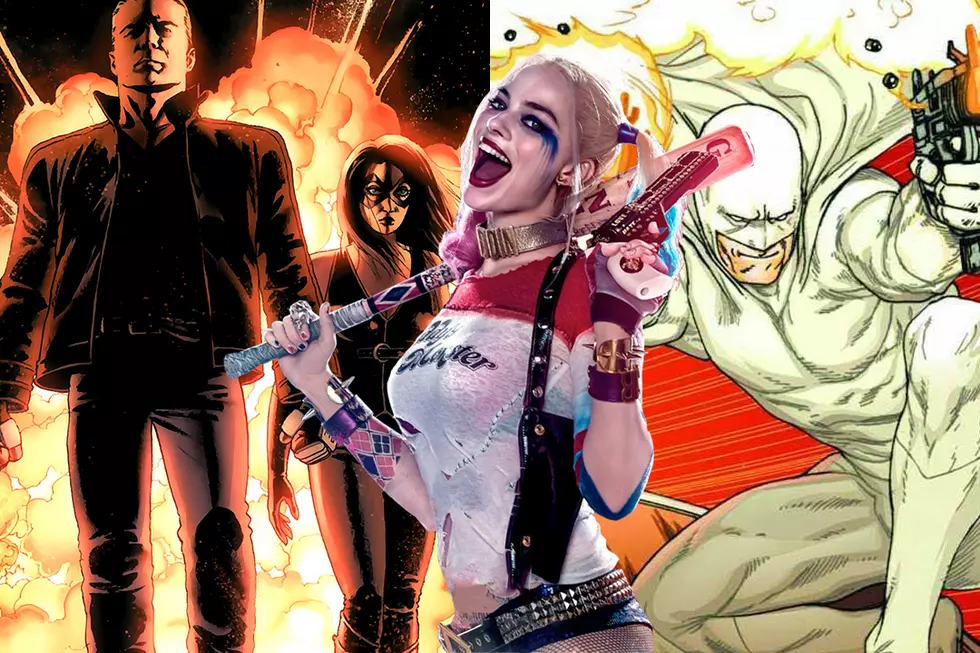
I Didn’t Mean To Kill All Your Friends But At Least The List Was Short: ‘Copra’ #17 Is One Of The Best Issues Of The Year
Listen: Michel Fiffe's Copra is great. If you've been reading ComicsAlliance for any significant amount of time -- or even if you've just been listening to the Every Story Ever segments on the War Rocket Ajax podcast where we've ranked it above stuff like "Robin Dies At Dawn," JLA: Year One and Grant Morrison's first arc on New X-Men -- then you already know that.
But at the same time, you could be forgiven for thinking that maybe, after that first run of twelve amazing DIY comics, Fiffe might've slipped a bit. After all, it's pretty rare for something to stay that good forever, and now that Fiffe's picking up mainstream work from Marvel in the pages of All New Ultimates and Dynamite with Captain Victory, you'd have a good reason to think that Copra would be on the back burner. But if you did, you would be wrong.
If, for whatever reason, you haven't been reading the second act of Copra, where Fiffe turns his attention to spotlighting individual members of the team, then you're missing out on some of the most amazing comics of the year -- and the latest issue, where Fiffe drops a treatise on and rejection of Randian Objectivisim in the form of a story about a superhero sent to an interdimensional prison, is the best of the bunch by far.
As you probably already know (mostly because we won't shut up about it), Copra is essentially Fiffe's take on the classic John Ostrander, Kim Yale and Luke McDonnell run on DC's Suicide Squad from the '80s. There are a few wrinkles thrown in, like analogues of Dr. Strange and the Punisher showing up in the first arc, but that's where the series has its roots, and since Squad's one of my all-time favorite comics, I've been hooked from the first moment.
This particular arc is of special interest -- it follows Ostrander's pattern of breaking up larger story lines with smaller tales focusing on individual members of the team, and Fiffe's stepping right into his footsteps. Copra #15 in particular is a comic that reads like a direct response to Suicide Squad #11, and by setting up his stories to mirror the ones he's inspired by, Fiffe is showing just how much he's willing to go in and tweak the formula to make these characters his own.
With this issue, "Rax," Fiffe is taking that to its logical extreme, crafting a story that's not just a response to a particular issue of comics, or even to a character, but to the entire philosophy and technique of that character's creator.
This issue focuses on Rax, an analogue for Shade the Changing Man, a relatively obscure character created by the legendary Steve Ditko after his departure from Marvel in the 1970s, when he was working without the relatively calming influence of Stan Lee. Like his inspiration, Rax has a supre-technological vest that responds to his thoughts and projects a terrifying form around his own body, exaggerating his features and giving him a terrifying presence. It's a great visual, and it's one that I'm surprised hasn't been used more often in comics, but I suspect Shade being packed off to Vertigo so long after Suicide Squad ended has an awful lot to do with that. Still, the idea is monumentally engaging, and as always, Fiffe does a beautiful rendition of it, with the twist being that Rax is losing mental control of his Vest, with the implication that it's because he no longer believes in what he's doing.
Generally speaking, Ditko's post-Marvel creations are notable as much for (or in some cases, even more for) the philosophy behind their creation than what's actually happening on the page, particularly with regards to his zealous endorsements of Objectivism. It comes through most prominently in characters like the Question and Mr. A, who literally carries a black-and-white card labeled GOOD and EVIL that he asks his prey to choose between, but it's there in Shade, too, and that's the idea that Fiffe's playing with here.
See, in return for his service, the Copra team got Rax back to his home dimension, where he was immediately jailed. If stealing something is a crime, and possession of a stolen object is a crime, then it's always a crime, even when there are extenuating circumstances that lead to being dragged through another dimension. And since he's a criminal, then he goes to prison, and since criminals always deserve to go to prison, then Rax obviously deserves to be locked up with the monsters and murderers who hated him while he was a cop, and spend their time beating him to a pulp every chance they get. And when his new cellmate is revealed to be the crystal monster that murdered his friends, then he deserves to die at Rax's hand, because murderers always deserve to die.
That's the philosophical underpinning of what's going on in this issue of Copra, with Rax fighting to use the vest, trapped not just in prison, but in a world where everything is viewed to be exactly as it seems, because how could it possibly be anything else? That idea bleeds into everything that forms this issue, from the way the characters interact to the way the pages are structured.
Fiffe uses the nine-panel grid here, and while it certainly echoes Ditko's style, it does a lot more than that, too. It puts the prison bars that are keeping Rax locked down right there on the page, continuing a structure from the opening splash to the moment right before the end where the story, and the thoughts behind it, finally break out of that that rigid grid. It's a great, simple technique that reinforces everything going on at multiple levels, and ends up being as close to a perfect story as you're likely to find.
In the letter column, Fiffe refers to this issue in a surprisingly humble fashion as as a tribute to Ditko, "in honor of a fraction of his legacy and as respectful as a personal wed dream on paper can be." Really, though, it's exactly the kind of comic Ditko was producing in his prime, a blend of superheroic sci-fi action built on a structure that's debating just what exactly morality is and how important it is to a character's life. Even if you haven't read the rest of the run -- which you should -- this is the one to pick up.
Copra is available from Michel Fiffe on Etsy and in collected editions from Bergen Street Comics Press.
More From ComicsAlliance





![Ninjak And The Eternal Warrior Are The Buddy Comedy Pair Of The Year In ‘Ninjak’ #20 [Preview]](http://townsquare.media/site/622/files/2016/10/NinjakPrev00.jpg?w=980&q=75)



